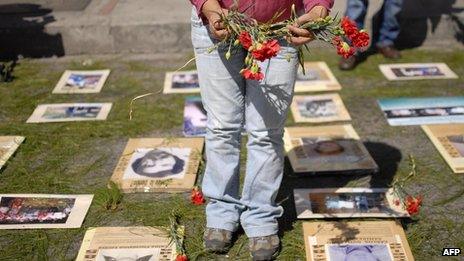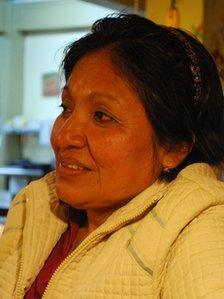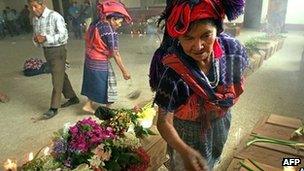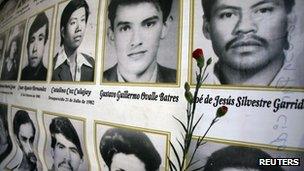Healing Guatemala's emotional scars from the civil war
- Published

The scars of the long civil war still run deep in Guatemala
The search for justice in Guatemala is continuing, more than 15 years after the end of the country's 36-year civil war. A former guerrilla, who is now a psychologist, tells the BBC of the trauma caused by one of the region's most brutal internal conflicts.
The story of Maria Tulia Lopez Perez and her family seems almost impossibly extreme, including as it does the worst hardships of social inequality, division and conflict.
But it is real.
And it is a story she hears daily in her work as a psychologist with the government's programme set up to compensate civil war victims and their families.
For the past three years, Maria, who still suffers chronic back pain from the torture she endured in 1985, has carefully recorded her patients' accounts of physical and emotional pain.

Maria was recruited into the rebels' ranks by a priest
Murder, disappearance, torture, rape, displacement and forced recruitment into the armed forces were the experiences of many victims.
At least 200,000 people were killed during the war, with the indigenous Maya population bearing the brunt of atrocities.
Maria's clients come to her suffering from depression, insomnia and post-traumatic stress.
Alcoholism is common, and many are also in physical pain from the torture they suffered.
Maria, 56, says her job helps her to remember she is not alone.
"This work, this is where my struggle is today," she says.
Maria's own father and brother were kidnapped and disappeared nearly 27 years ago.
She had no contact with her mother for 16 years during the war.
As a nurse for a guerrilla group, she saw people killed, maimed and traumatised.
Revolution
Her involvement with the rebels began in 1978, when she was a young trainee teacher in her home municipality of Malacatan, in western Guatemala.
A Spanish priest recruited her to the Revolutionary Organisation of Armed People (ORPA).
"It wasn't rare that a priest should be involved. He said a large revolutionary movement was building and he was part of it," Maria says.
"When he eventually asked us, we were excited to join. I had for a long time been thinking about how we could change things.
"We grew up barefoot. Six of my younger siblings died of hunger. We were always afraid of death," said Maria.

The war ended in 1996 but families have continued to grieve and search for victims
"I wasn't scared when I joined ORPA, but what troubled me was that I hadn't finished my degree yet. I asked the priest how long he thought we would be fighting and he said three or four years."
It would be another 20 years before she finally qualified as a teacher.
Maria and a fellow rebel pretended to be married and rented a small house where they could treat wounded guerrillas.
She drove alone into the mountains to retrieve the injured.
"I told the neighbours I sold at the market, to explain why I always had so much stuff," she says.
She recalls one injured rebel, Pedro. Other fighters had had to amputate one of his arms with a knife. He had been blinded by an explosion, and had lost two fingers from an infection on his remaining hand.
"I washed out the wound but found it full of worms. I sterilised my own tweezers and started removing them but there were so many.
"I called my friend, whose brother was a doctor, and invented a story to get advice. He told me to boil basil in water. I dripped it into the wound and all the worms started crawling out."
She nursed Pedro back to health, but he remained blind.
"He had left a wife and children behind to go and fight, but he never returned to them because he was worried they'd be afraid of his physical state," said Maria.
Soldier brothers
In 1985, Maria was captured by members of the government's military intelligence unit, beaten and interrogated for 22 days before being released.
Shortly afterwards, her father and brother were kidnapped and disappeared.
Two of her other brothers were forcibly recruited to the Guatemalan military - a common tactic used by government forces during the war.
"I have still never discussed where I was during the war with my family. I would like to, but now I have two ex-soldiers in my family."
The conflict was terrible for her mother, Maria says.
"When I returned she almost fainted. It was like a whole new trauma for her. She thought my father and brother would reappear with me, but they did not."

Victims remembered: 25 February is now the National Day of Dignity
Earlier this year a judge ruled that ex-Guatemalan military leader Gen Efrain Rios Montt would be tried for genocide and crimes against humanity.
Gen Rios Montt, 85, was in power from 1982-1983 when some of the worst civil war atrocities occurred, but has denied ordering massacres.
With such a painful recent history for Guatemala, can victims of the conflict ever feel that justice has been done?
"Judicial justice is the best form of compensation for victims, much better than money or anything else," says Maria, but she says too few people have been tried.
Funding for the programme Maria works for has been secured for another year by the new government.
But she says in post-war Guatemala there has not been enough focus on healing people's psychological wounds.
"We must liberate the victims from all this weight they are carrying which stops them from living normal lives."
- Published27 January 2012